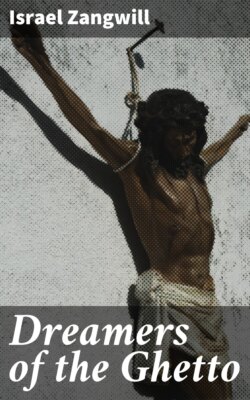Читать книгу Dreamers of the Ghetto - Israel Zangwill - Страница 18
На сайте Литреса книга снята с продажи.
VII
ОглавлениеJoseph the Dreamer was half stunned by this second blow to his dreams. An earthly anxiety he would not avow to himself consumed him during the progress of the plague, which in spite of all efforts escaped from the Ghetto as if to punish those who had produced the conditions of its existence. But his anxiety was not for himself—it was for his mother and father, it was for the noble Miriam. When he was not in fearless attendance upon plague-stricken Christians he walked near the city of the dead, whence no news could come. When at last he learned that his dear ones were alive, another blow fell. The Bull was still to be enforced, but the Pope's ear was tenderer to the survivors. He respected their hatred of Fra Giuseppe, their protest that they would more willingly hear any other preacher. The duty was to be undertaken by his brother Dominicans in turn. Giuseppe alone was forbidden to preach. In vain he sought to approach his Holiness; he was denied access. Thus began that strange institution, the Predica Coattiva, the forced sermon.
Every Sabbath after their own synagogue sermon, a third of the population of the Ghetto, including all children above the age of twelve, had to repair in turn to receive the Antidote at the Church of San Benedetto Alla Regola, specially set apart for them, where a friar gave a true interpretation of the Old Testament portion read by their own cantor. His Holiness, ever more considerate than his inferiors, had enjoined the preachers to avoid the names of Jesus and the Holy Virgin, so offensive to Jewish ears, or to pronounce them in low tones; but the spirit of these recommendations was forgotten by the occupants of the pulpit with a congregation at their mercy to bully and denounce with all the savage resources of rhetoric. Many Jews lagged reluctant on the road churchwards. A posse of police with whips drove them into the holy fold. This novel church procession of men, women, and children grew to be one of the spectacles of Rome. A new pleasure had been invented for the mob. These compulsory services involved no small expense. By a refinement of humor the Jews had to pay for their own conversion. Evasion of the sermon was impossible; a register placed at the door of the church kept account of the absentees, whom fine and imprisonment chastised. To keep this register a neophyte was needed, one who knew each individual personally and could expose substitutes. What better man than the new brother? In vain Giuseppe protested. The Prior would not hearken. And so in lieu of offering the sublime spectacle of an unpaid apostleship, the powerless instigator of the mischief, bent over his desk, certified the identity of the listless arrivals by sidelong peeps, conscious that he was adding the pain of contact with an excommunicated Jew to the sufferings of his brethren, for whose Sabbath his writing-pen was shamelessly expressing his contempt. Many a Sabbath he saw his father, a tragic, white-haired wreck, touched up with a playful whip to urge him faster towards the church door. It was Joseph whom that whip stung most. When the official who was charged to see that the congregants paid attention, and especially that they did not evade the sermon by slumber, stirred up Rachel with an iron rod, her unhappy son broke into a cold sweat. When, every third Sabbath, Miriam passed before his desk with steadfast eyes of scorn, he was in an ague, a fever of hot and cold. His only consolation was to see rows of devout faces listening for the first time in their life to the gospel. At least he had achieved something. Even Shloumi the Droll had grown regenerate; he listened to the preachers with sober reverence.
Joseph the Dreamer did not know that, adopting the whimsical device hit on by Shloumi, all these devout Jews had wadding stuffed deep into their ears.
But, meanwhile, in other pulpits, Fra Giuseppe was gaining great fame. Christians came from far and near to hear him. He went about among the people and they grew to love him. He preached at executions, his black mantle and white scapulary were welcomed in loathsome dungeons, he absolved the dying, he exorcised demons. But there was one sinner he could not absolve, neither by hair-shirt nor flagellation, and that was himself. And there was one demon he could not exorcise—that in his own breast, the tribulation of his own soul, bruising itself perpetually against the realities of life and as torn now by the shortcomings of Christendom as formerly by those of the Ghetto.
